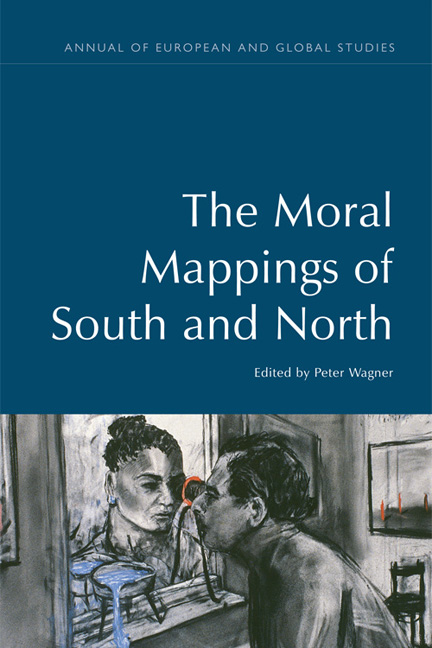Book contents
- Frontmatter
- Contents
- List of Figures
- Notes on the Contributors
- Acknowledgements
- 1 Finding One's Way in Global Social Space
- 2 Does the World Have a Spatio-political Form? Preliminaries
- 3 The BRICS Countries: Time and Space in Moral Narratives of Development
- 4 Russia between East, West and North: Comments on the History of Moral Mapping
- 5 Digging for Class: Thoughts on the Writing of a Global History of Social Distinction
- 6 North–South and the Question of Recognition: A Constellation Saturated with Tensions
- 7 On Spaces and Experiences: Modern Displacements, Interpretations and Universal Claims
- 8 The South as Exile
- Index
1 - Finding One's Way in Global Social Space
- Frontmatter
- Contents
- List of Figures
- Notes on the Contributors
- Acknowledgements
- 1 Finding One's Way in Global Social Space
- 2 Does the World Have a Spatio-political Form? Preliminaries
- 3 The BRICS Countries: Time and Space in Moral Narratives of Development
- 4 Russia between East, West and North: Comments on the History of Moral Mapping
- 5 Digging for Class: Thoughts on the Writing of a Global History of Social Distinction
- 6 North–South and the Question of Recognition: A Constellation Saturated with Tensions
- 7 On Spaces and Experiences: Modern Displacements, Interpretations and Universal Claims
- 8 The South as Exile
- Index
Summary
Faraway, so close: the South
THE TERMS ‘Global South’ and ‘Global North’ are the latest in a long series of conceptual distinctions that serve as attempts at world-interpretation and world-ordering. By now they are widely used without further explanation, in particular the term ‘Global South’, showing that they have entered common language in global public debate. A recent bibliometric study showed that the use of the term ‘Global South’ in the social sciences and humanities has been steadily increasing from 19 in 2004 to 248 in 2013 (Pagel et al. 2014; for general reflections on this rise, see Hylland Eriksen 2015). There are now scholarly journals that carry the term in their title, such as The Global South, published by Indiana University Press and already in its tenth year, or the open access online journal Bandung: Journal of the Global South. Higher education institutions have started to honour the concept by institutionalising it, such as through the Global South Unit at the London School of Economics and Political Science or the Global South Studies Center at the University of Cologne. If rapid diffusion is a measure, the apparently geographical distinction between South and North is a great success.
At the same time, this distinction is problematic in numerous respects. Indeed, the stream of publications in which the term ‘South’ is used as a concept – or, some might prefer to say: in place of a concept – as if it had an evident and generally accepted referent keeps being accompanied by a debate about the very meaning and usefulness of the term, in which numerous and not at all consonant voices can be heard. To give just a few illustrations: conceptually, the distinction between North and South has multiple – overlapping, but not identical – meanings. North/South may be taken to be a distinction between the rich and the poor, the dominant and the dominated, the centre and the periphery, the ‘advanced industrial societies’ and the ‘developing’ ones, among others. Empirically, the Global South is not identical with the southern hemisphere, in which societies of the Global North, such as Australia, are located, and vice versa.
- Type
- Chapter
- Information
- The Moral Mappings of South and North , pp. 1 - 17Publisher: Edinburgh University PressPrint publication year: 2017



